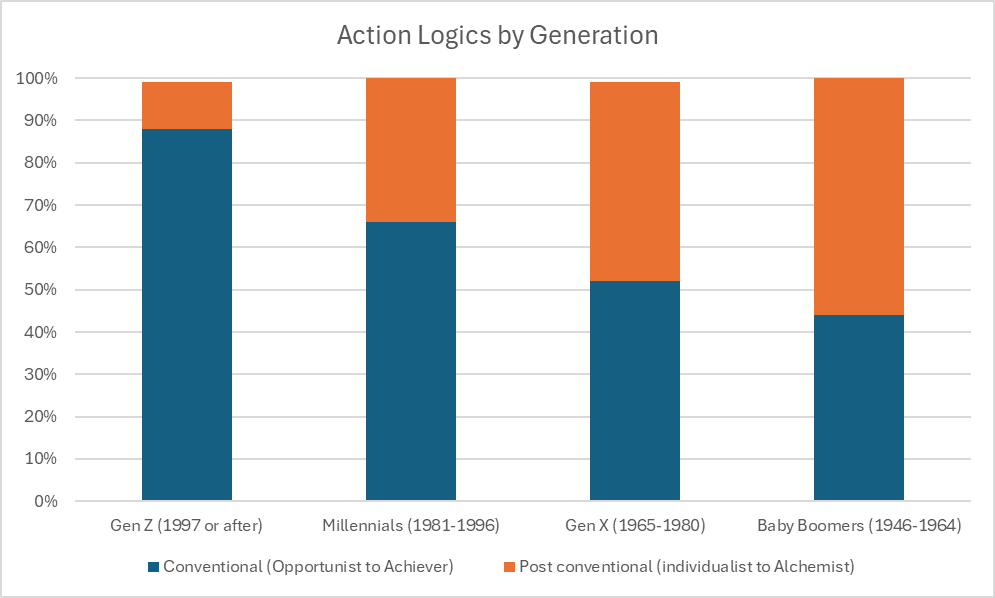The IDG assessment now integrate Action Logics, a developmental framework inspired by the pioneering work of Bill Torbert, into the reports. This new feature helps you discover your primary Action Logic (the inner operating system that influences our worldview) and the implications for your development. In this article, we’re diving into an analysis of how these logics vary across generations, based on data from 1,499 users collected over the past 1.5 years.
Understanding Action Logics: Conventional vs. Post-Conventional
Action Logics describe how individuals interpret their world and take action, evolving through stages over time. Conventional Action Logics(Opportunist, Diplomat, Expert, Achiever) focus on self-interest, rule-following, technical mastery, and goal achievement – traits common in early to mid-career phases when stability and results dominate.
Post-conventional Action Logics (Individualist, Strategist, Alchemist) emerge with deeper reflection, embracing authenticity, systems thinking, and transformative change – typically seen in later developmental stages or with intentional growth work.
Breaking Down the Chart

The chart visualizes the distribution of Action Logics, split into conventional and post-conventional stages, across four generational cohorts:
- Gen Z (1997 or after): 89% conventional, 11% post-conventional.
- Millennials (1981–1996): 66% conventional, 34% post-conventional.
- Gen X (1965–1980): 53% conventional, 47% post-conventional.
- Baby Boomers (1946–1964): 44% conventional, 56% post-conventional.
These percentages reflect each user’s primary Action Logic, revealing a clear trend: post-conventional thinking increases with age within our community.
Key Action Logics Insights by Generation
- Gen Z cluster at early developmental stages, perhaps navigating entry-level challenges or identity exploration. They could flourish with tailored foundational exercises (such as trust-building activities and guided self-reflection) to smoothly transition from survival-driven Opportunist tendencies to the collaborative and authentic stages of higher development, unlocking their latent capacity for innovation and leadership.
- Millennials (mid career) blend results-driven habits with a quest for authenticity and collaboration. They can accelerate their growth by launching self-organized groups and collaborative projects, channeling their strong Individualist drive to create shared pathways toward deeper, more impactful leadership.
- Gen X shows a significant leap, with 47% post-conventional as mid-life reflection unlocks systems thinking and transformative potential. They can channel their life experience and wisdom through cross-generational mentoring, nurturing adaptive problem-solving and guiding their shift from mid-career stability to visionary leadership.
- Baby Boomers: Wisdom in Action. They can boost their impact by mentoring younger generations and cultivating cultures where people are encouraged to explore and express their full potential. Their rich life experiences and focus on legacy make them ideal transformational leaders.
Why These numbers Differ from Traditional Research
For those acquainted with Bill Torbert’s 2005 HBR study of 4,310 individuals, where approximately 85% remained in conventional stages, our findings skew more to post-conventional Action Logics. The 31% post-conventional average among our 1,499 users (compared to a general population estimate of 15%) underscores the unique, self-selected, and growth-driven nature of our community.
Motivation as a Catalyst: Our users are propelled by a deep desire for self-development, resonating with Torbert’s insight that action inquiry flourishes when individuals are intentionally committed to growth. There is evidence from a 2002 paper by Cook Greuter that amongst 535 managers & consultants in the UK the Post-Conventional Action Logic also rises above 30%.
Beyond Age – The Role of Context in the Wisdom Curve
This compelling “wisdom curve” where post-conventional thinking climbs from 11% in Gen Z to 56% in Baby Boomers reflects how life experiences foster a more holistic and compassionate approach to challenges. Research in developmental psychology, such as Susanne Cook-Greuter’s ego development studies (2011), shows that accumulated life experiences – navigating relationships, career shifts, and personal trials – expand our perspective, with late-stage individuals demonstrating greater integration of systems and empathy. Torbert’s action inquiry research further supports this, noting that individuals with diverse life encounters, like those reaching Alchemist or Strategist stages, often exhibit heightened compassion, with data from his 2005 HBR study suggesting a correlation between life complexity and emotional intelligence.
Yet, age is only a proxy. The true drivers are exposure to conditions that invite reflection (times of transition, meaningful struggle, or purpose-driven work). In coaching, we see Millennials and Gen Xers showing strong post-conventional traits precisely because their life or work context has pushed them into complexity earlier. This suggests that contextual accelerators like crises, leadership roles, or intentional practices can fast-track growth regardless of birth year.
Whether you’re a Gen Z Opportunist laying the groundwork, a Millennial Individualist forging authentic paths, a Gen X Strategist honing mid-life mastery, or a Boomer Alchemist shaping a lasting legacy, your journey through life’s stages—and the reflective contexts you embrace—cultivates this transformative arc. Discover your own Action Logic and growth potential by exploring the updated IDG assessment today!

